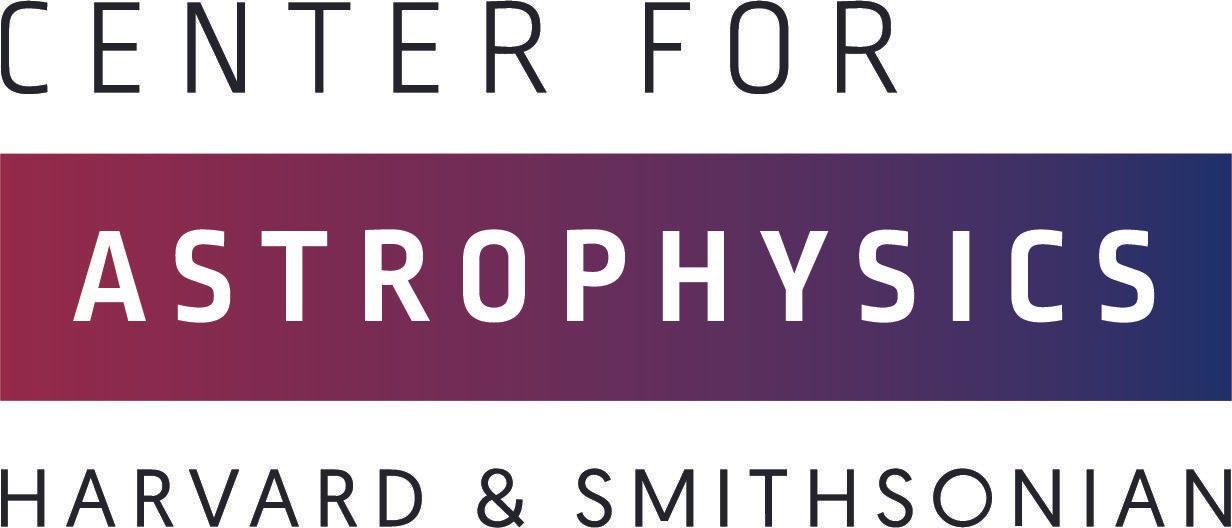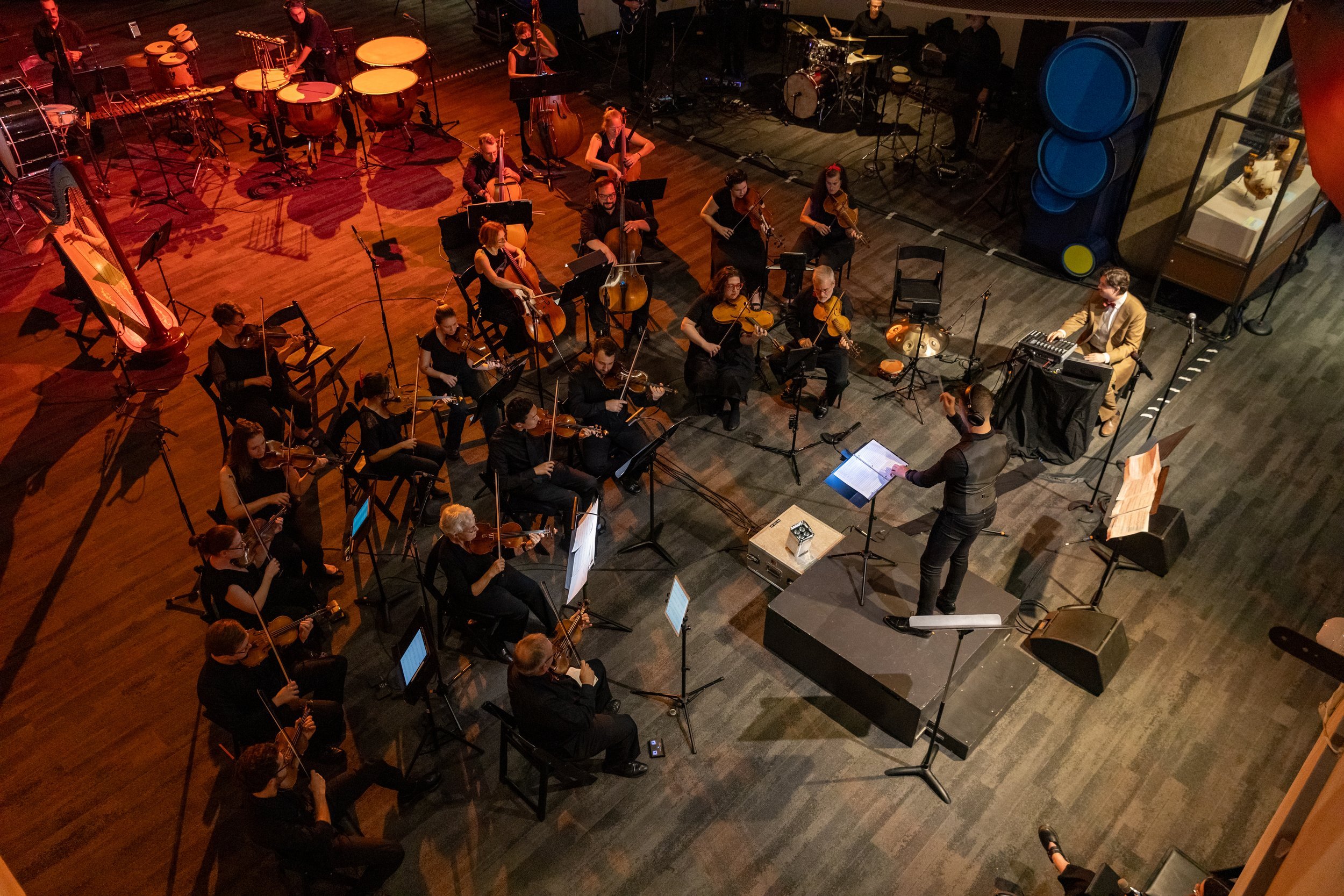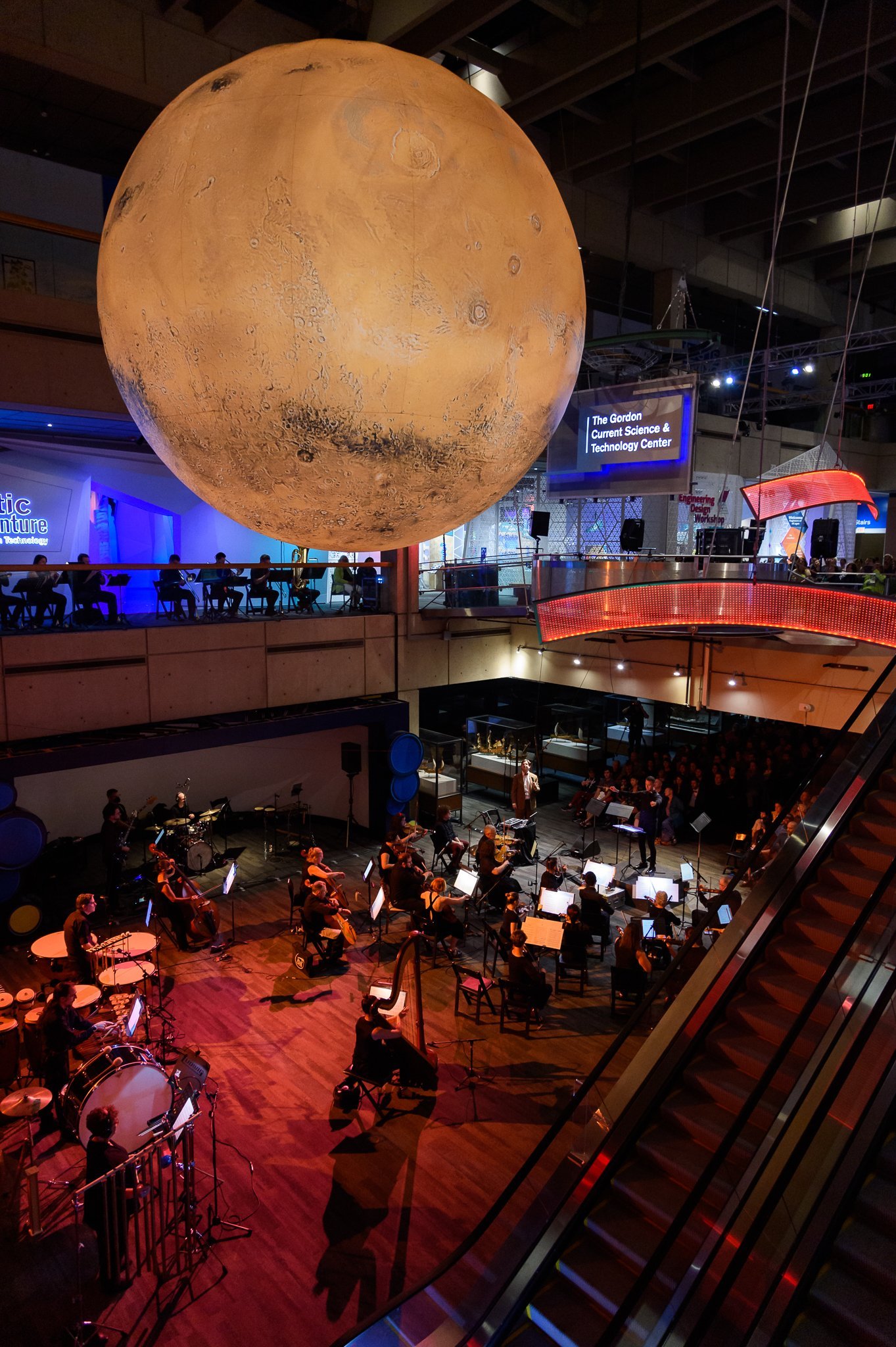“[Mars Symphony] included a touching aria sung from the point of view of a Mars rover by soprano Agnes Coakley Cox, a lonely solo on the electric guitar, and musical translations of altimeter data that mapped the radical elevation changes on the seemingly barren planet.” A.Z. Madonna, Boston Globe
“When composer David Ibbett visualizes the terrain of Mars, he hears a full symphony.” Henry Bova, Boston Globe
“A fusion of classical and electronic music created from cutting edge data.” Bethan Ackerly, New Scientist on Mars Symphony
“What we are hearing is Otis Peak Sample Core … it truly sounds otherworldly” WGBH Culture Lab
“The new composition aims to bring the thrill of space exploration down to Earth and turn the science of Mars into art.” Tom Metcalfe, Nautilus Magazine
“In its dedication to the new and unknown, Black Hole Symphony inspires as much as it informs.” New Scientist article on Black Hole Symphony by Bethan Ackerly
“Your stuff SO captures the essence [of black holes] - it’s insane!” Jim Braude GBH News
“David’s work as a composer is incredibly beautiful, and it’s such a unique fusion where every component is ingrained in science research, which is unique in this field. It’s changing the landscape of science communication” Boston Globe Review of Black Hole Symphony
“Bringing the science of the universe to everyday listeners through music.” GBH News
“Somehow science and music illuminated the wonders of the larger cosmos within that seemingly microcosmic dome…transparent to time and distance” Synaesthesia to the Nth Degree review of Black Hole Symphony by Stephanie Oestereich, Boston Music Intelligencer
“Combining orchestral and electronic elements, his compositions unlock the surprising layers of drama, foreboding, and hope hidden within the charts and figures that describe some of humanity's most significant discoveries. They bring a sense of wonder to the age of stunning scientific advancement we're living through.” - Berklee College of Music Article and Podcast
“Running the complex edge between the familiar and novel, utilizing the technology without becoming seduced by it, acoustic ears driving a cybernetic imagination - and you can quote me on that” Lawrence de Martin, Acoustic Engineer
Octave of Light featured in New Scientist - February 2021 “Don’t Miss: Listen”
“The discovery of habitable exoplanets. Music to his ears.” Big Picture Science Radio Show & Podcast on Octave of Light Album
“Composer David Ibbett encodes the dreams and details of complex physics phenomena into music to help audiences appreciate their splendour.” Nature
“United States’ particle physics and accelerator laboratory Fermilab announced… the institute’s first guest composer, David Ibbett.” Eva Amsen, Forbes Magazine
Astronomy “Octave of Light” turns exoplanet data into music
“The opening track “Water Romanza”; a sprawling and gorgeous introduction to the world Ibbett has created, bolstered by Sterling’s impressive vocal” Andrew Bourque of the Allston Pudding on Octave of Light album
“Ibbett’s compositions give a new interpretation on scientific data that can make work like Sousa-Silva’s perhaps feel slightly more tangible to an outsider. But even Sousa-Silva herself looked at her research in a new way after hearing the compositions.” Eva Amsen, Forbes Magazine
“Ibbett lengthened these light waves to lower their high frequency and ‘translate’ them into sound waves the human ear can detect. The result was haunting pieces of music that let us listen to the possibility of extraterrestrial life.” Sara Truuvert, Art The Science
“David Ibbett’s Multiverse Concert Series is an intriguing exploration of exoplanetary research, interpretive composition, and data sonification. Wide-ranging musical translations reveal the grace and intricacy of light spectroscopy and red edge reflectance creating new sonic worlds and Minjin Chung’s beautifully pared down performance of ‘Phosphine: Life Anaerobic’ on solo cello. The universe beyond our solar system seems so much closer.” Seisma Magazine
“With its modern musicality, “Particle of Doubt” underscores that neutrinos are neither massless nor changeless – nor voiceless.” Leah Hesla, Fermi National Accelerator Laboratory
“His love and skill in combining music and science was such an exciting new venture for the lab to explore.” Janet Mackay-Galbraith, Head of the Arts and Lecture series at Fermilab
“It will be an out of this world experience when David Ibbett… debuts his first album, "Octave of Light," in a performance at the Boston Museum of Science” Richard Duckett, Worcester Telegram & Gazette
“Multiverse Concert Series continues to be one of the most exciting companies I have had the pleasure of experiencing as an audience member, let alone collaborating with and presenting as a part of our Adult Programming at the Museum of Science, Boston. Their work is the epitome of why it is crucial for us as a society to examine STEM-related issues through an artistic lens and the beautiful end results that come from fusing together art, science and technology. The talent driving the company forward is simply astounding- and audiences remain riveted, captivated and intellectually stimulated the entire time the incredible lineup of scientists, experts, artists and performers commands the stage or screen. I think their work is groundbreaking and revolutionary for audiences of all ages- something not many can accomplish. I am honored to have them becoming a quick staple and highlight of our ongoing programming.” James Wetzel, Producer of Adult Programs at Museum of Science, Boston
“A WPI professor is set to debut his first musical album this week and it's out of this world.” Spectrum News Channel, Worcester MA
“David Ibbett’s Branches, a work that juxtaposes the upper register of marimba and the lower warmth of the bass clarinet register… consistent and dry percussive loops over which lyrical melodies float, and the piece is structured around a dream-like marimba solo. Advocat’s bass clarinet sound reaches peak density in this work.” Mathew Younglove, I Care If You Listen
“Is life sustainable on other planets? If music is a clue, David Ibbett, Professor of Arts & Sciences, [at WPI] can tell you the answer.” Jessica Messier, Worcester Polytechnic Institute Blog
“Molecules are halfway to being musical instruments to begin with, because like a violin string, a molecule vibrates and rotates and resonates. That's similar to what David is actually doing with musical instruments.” Roy Gould, Harvard Center for Astrophysics
“David has undertaken a project to sonify the chemical spectra data for exoplanets. That is, to turn their chemical signatures into sound… He's carrying out an experimental idea that some exoplanet hunters have proposed because our ears are fine tuned instruments. They're able to detect tiny changes in a wide range of frequencies. For example, we can hear eight octaves of sound - that's the run of a piano keyboard.” Big Picture Science Radio Show & Podcast on Octave of Light Album.
“I have felt completely immersed in the journey into the micro world that is beyond our senses. And you have successfully taken the whole audience into the place we couldn't experience in another way than art and music!“ Anna Barnacka, Black Hole Researcher
"David's music [for piano and electronics] is symphonic, lush, virtuosic, meticulously crafted, and full of so much heart" Sophia Subbayya Vastek, pianist
"The music is like Mozart mashed up with Club Beats and Electronica" Original Gravity Concert Series
“[Without Words], really appealed to us and we have taken it into our repertoire. It is the only commission on our CD and we love it. It has really pushed us technically, and opened doors to new ideas and compositions” Living Room in London
"Some may notice their toes are tapping while they groove to his exciting rhythmic complexities" Boston Music Intelligencer













